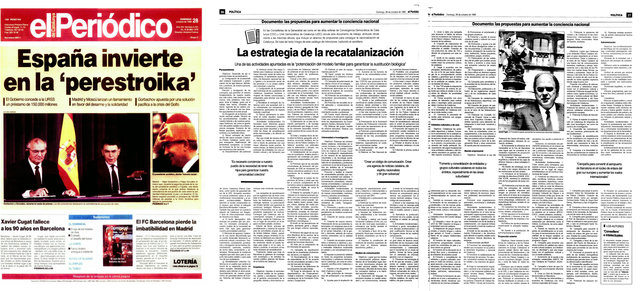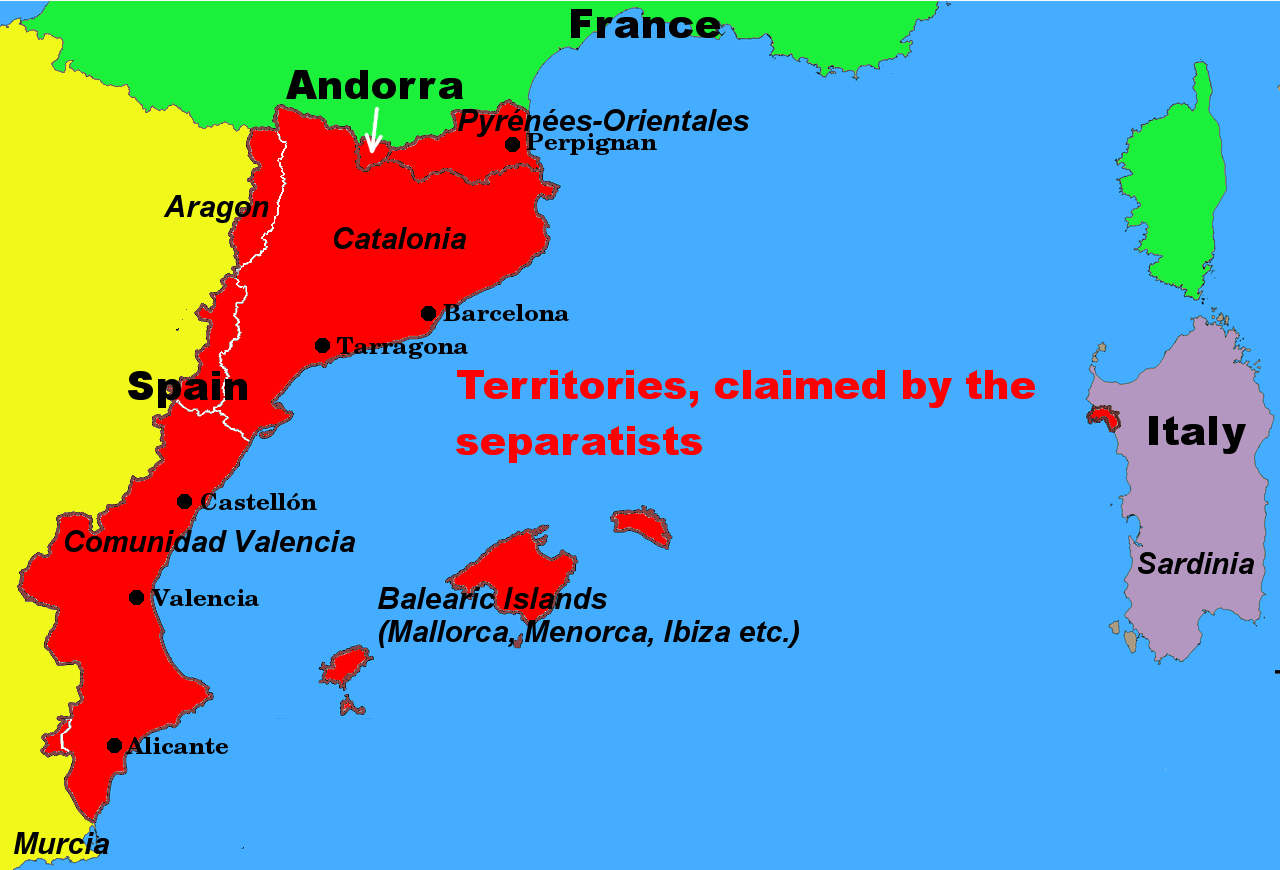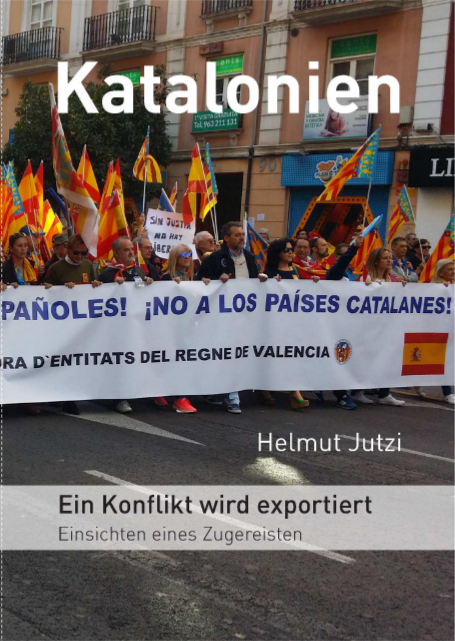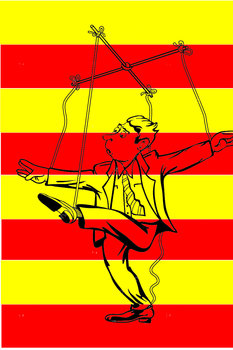Separatism and social manipulation
by Dr. Antonio Jimeno, president of teacher's union AMES
In the 1980s, the governments led by Jordi Pujol (President of the Catalan government 1980-2003, indicted for money laundering and tax evation in 2014) set themselves the objective of making Catalonia, by peaceful means, a nation independent of the rest of Spain. That is why they had to use the main mechanisms of social manipulation to achieve it.
Human beings, whatever their cultural level, rebel against injustice and are capable of reacting with firmness and the capacity to sacrifice, but they are incapable of maintaining this struggle for many years, of overcoming the betrayal of their leaders and of continuing to fight when the majority no longer does so, or when the problem no longer affects them.
Aware of this, the promoters of the separatist process in Catalonia agreed on a strategy based on the fact that this should be a very slow process, lasting more than twenty years and that it should cover all sectors of human activity. This is what is contained in the so-called Programme 2000, which began in the 1980s and was published in 1990 in the newspaper „El Periódico“. The first action they took was to impose the exclusive use of Catalan in education, in all administrations, in the public media, or subsidised with public funds, and to encourage all companies in Catalonia to do the same. Proof of this was the Linguistic Normalisation Act of 1983.
This was accompanied by the imposition of a change of style with respect to the way of referring to Spain and everything Spanish. This change consisted of presenting the governments of Spain, both past and present, as the great enemies of Catalonia, its economy, its language and its culture; of not making any reference to anything positive that Spaniards could do in any field, be it political, social, economic, cultural or sports; of ridiculing everything that is common to all Spaniards, such as the monarchy, the constitution, the army, the police, trains, motorways, the management of ports and airports, etc. For example, in the political information it was a question of emphasizing much more the autonomic regulations than the general laws that are above, in the sports news it was a question of not saying that the winner was Spanish, but to emphasize if it was Catalan, even if it had scored lower, in the weather forecast it was necessary to give the data of all the lands of what they call unjustly „países catalanes“ (Catalan countries), but not those of Aragon, although, for example, Alicante is much farther from Catalonia than Huesca or Zaragoza, etc.
They acted on the language and on the feelings because the differences between two nations are basically these: Having a different language and an emotional account of the different history. For this reason, the separatists focused on these two aspects, often diverting funds initially destined for health, education and infrastructure. Achieving all this was not an easy task, as most Catalan families have people from the rest of Spain. It was achieved because the process developed slowly, even temporarily halting it when there were many protests, and perfectly applying Asch's „conformation with the group“ principle, Milgram's „obedience to authority“ principle, and Sharp's „soft coup d'état method“.
The principle of „group conformity“ was proposed by social psychologist Solomon Asch, after an experiment in which a person was shown three lines of similar length and asked which of them was the longest, but after other people, who were actually actors, with their majority had leaned towards the second line in length. Asch found that the influence of the group is so great that many people do not dare to confront the group to maintain their own criteria, but tend to accept the opinion of the group and even come to use the same words and the same approaches of the group, in order to be fully accepted. This is what is now called being politically correct. In conclusion, the fear of being rejected by the group may cause the individual not to want to exercise his freedom of thought, that is, unconsciously assumes that his personality is annulled.
As in Catalonia almost half of the population is Catalan-speaking and with several generations born in Catalonia, the new government's proposal to prioritise Catalan over Spanish and to feel like a victim of the rest of Spain was well received by many of them. A process of encouraging began that led them to a take over in the social, work, educational, media and even family environments. It was enough for a person to say that she always spoke and wrote in Catalan, to be well accepted. And if, moreover, he commented that all the problems in Catalonia were due to the clumsiness and bad faith of the Madrid government, then all the doors were already open to him. The thinking of the organized group, as always happens, was imposed. This is something that should be taken more into account in democracies in order to prevent organised citizens from crushing the unorganised.
The principle of „obedience to authority“ was proposed by the psychologist Stanley Milgram, after carrying out an experiment consisting of proposing two people, who did not know each other, to participate in a test in which one of them, by lottery, would be the apprentice and would go to a certain room, in which he would be asked a question and in he answered incorrectly, he would receive a small electric shock. The other person would act as a teacher, they would be in another roomwith the psychologist and the teacjer would be the one who would ask the questions and press the switch. In reality the draw was rigged, the apprentice was an actor and did not receive any discharge, but the person who played the teacher did not know this. When the teacher had compassion with the apprentice, because he failed many times and so was shocked and asked the psychologist if the experiment could be finished, the psychologist always answered phrases such as „Please continue“, „The experiment needs you to follow“, „It is absolutely essential that you continue“, „You must continue“ etc. The experiment was repeated with many people and the result was that in 65% of the cases the teacher obeyed and continued to send shocks, even though there were many. The conclusion is that an important proportion of people consider that the right thing to do is what they have been told to do, that is, to follow the directives of the leader or the majority, without questioning whether they are right or wrong, and all the more so if, once consulted, they have been told to continue doing so. Some do it because they agree that what is said above should always be done, and others because they know that disobeying can lead to complications.
The principle of „obedience to authority“ explains that many separatists do not react against approaches by their leaders that are clearly an aggression to people's basic rights. For example, stand firm against the denial of the right of parents to have their children attended in their mother tongue,when they start school, agree to continue with public media in Catalonia in which Spanish is never used and in which people who are in favour of Catalonia continuing to be part of Spain cannot participate equally, it seems good to them that there are symbols in schools and propaganda is made for their party political options, not to prevent textbooks containing the same approaches and to encourage aversion to the rest of Spain, to continue the punishment companies that label their products only in Spanish, not to demand that all the writings of a community with two co-official languages must be written in the two languages, including street signs, etc.
The „soft coup d'état method“, devised by political scientist Gene Sharp, is a set of non-violent techniques aimed at destabilising a government, without it being noticed that it is the consequence of a plan. The governors of Catalonia and their ideologues began by spreading rumours of corruption among certain members of the Spanish government, denouncing on social networks that these politicians were favouring their relatives and friends, that they did not care enough about the country, and that they were very much at odds with each other. They were then accused of totalitarianism because they restricted press freedom and because they did not respect the human rights of the most disadvantaged. Collectives with a problem were then mobilized to organize demonstrations demanding social improvements and demanding, as a solution, that the Government of Spain delegate many of its powers to other entities. They tried to make these demonstrations as numerous, annoying and long-lasting as possible, and always to do so in front of the national government buildings, never in front of those of the autonomous government, at the same time that, cynically, they asked that the forces of public order not intervene, in order to avoid worse evils.
Subsequently, the Catalan autonomous government began to make declarations that it would not comply with this or that regulation, then went on to actually not comply with them, then to make regulations that failed to comply with state laws, then to fail to comply with court rulings while asking for dialogue and making victimizer declarations in international forums. The aim was to demonstrate the inability of the central government to govern the country.
This was followed by increased pressure in the streets with large demonstrations, such as those on 11 September, Catalonia's official holiday, while at the same time spreading the idea that the solution to all problems simply consisted of the Spanish government giving in to its pretensions to hold a referendum of self-determination in which only the Catalans voted, that is, without allowing the rest of the Spanish people to vote on the future of their own country. When the forces of law and order intervened against this unilateral and unconstitutional decision made on 1 October 2017, the pro-independence population was encouraged to make passive resistance and the images were sent abroad to further discredit the government of Spain, with the aim of isolating it internationally. They did not care, nor do they care now, that due to the instability they had created, many Catalan companies left Catalonia, nor that others did not come, given that the more the economic problems increase, the more difficult it will be for the Spanish government to withstand this instability.
The other aspect that was mentioned at the beginning of this article, in order to achieve a change of mentality in society, that is, to manipulate it, is the enormous frustration and paralysis that human beings suffer when they see that those in whom they had placed their trust to defend them, use that trust to first rise up and then make a pact with their aggressors. This is what has always happened with the governments of Spain, whether of the PSOE (like Labour) or the PP (like Tories). Both parties, whenever they have needed a handful of deputies to rule the rest of Spain, have not hesitated to pact with the nationalist parties, despite the fact that this implied allowing them to continue with the exclusion of the Spanish party and the ideological indoctrination in their communities. It has been a great mistake that these two parties did not agree between them, prioritizing the interests of their country over the interests of their parties. It is evident that the transición (political transition from Franco to democracy) was not done well, since the State was not left with measures that would make it possible to control what is taught in all the schools and that would allow action to be taken against the attacks on citizens' freedoms by the local political powers. Today we see that our transición is not a good model for anyone.
The most important thing about the problem is not that a country breaks up, the most important thing is the emergence of a new country in which half of the citizens become second-class citizens, without the right to speak their own language, condemned to assume the unique thinking of their government, to live with informers of their thoughts, with a media turned into a means of political propaganda, with an obedient judiciary, with a business fabric of government addicts and with workplaces to which others will always have preference, because in a small country, everyone knows each other.
In order to avoid this, we have to do exactly the opposite of what they have done, we have to defend living in a country in which nobody wants to impose their language or political ideas on the rest, in which schools are politically neutral, the media are plural in terms of language and propositions, and in which everyone is considered first-class citizens. This is so much better for everyone, that it is certain that in the end it will be achieved.
The Spanish original is here to be found. I apologize for any translation errors. If you know better, please write to me.
Comments in brackets and Italic are made by the translator.
| | | | Click here to subscribe or cancel your subscription |
Myths and deceptions of Catalan nationalism

Here you'll find the translation
The strategy of recatalanization
 1980 the Spanish journal "El Periodico" published a secret document about the strategy of the Catalan government. It shows in a frightening way the actual spiritual world of the separatist leaders.
1980 the Spanish journal "El Periodico" published a secret document about the strategy of the Catalan government. It shows in a frightening way the actual spiritual world of the separatist leaders.Now it is available in english translation.
Pancatalanism
the separatist's imperial claim
 The Catalan government exports the conflict into communities with Catalan population, supporting all efforts of the separatists including financial means to destroy Spain.
The Catalan government exports the conflict into communities with Catalan population, supporting all efforts of the separatists including financial means to destroy Spain. An important tool is the establishment of a language dictatorship that is not afraid to use the same means as Franco.
Separatist indoctrination

Click here to read the study
Publications
 The title says: "Catalonia, a conflict is exported. Insights of a migrant"
The title says: "Catalonia, a conflict is exported. Insights of a migrant"Sorry, up to now, this book is only available in German. However, drop us a line, if you are interested to learn more Contact.
